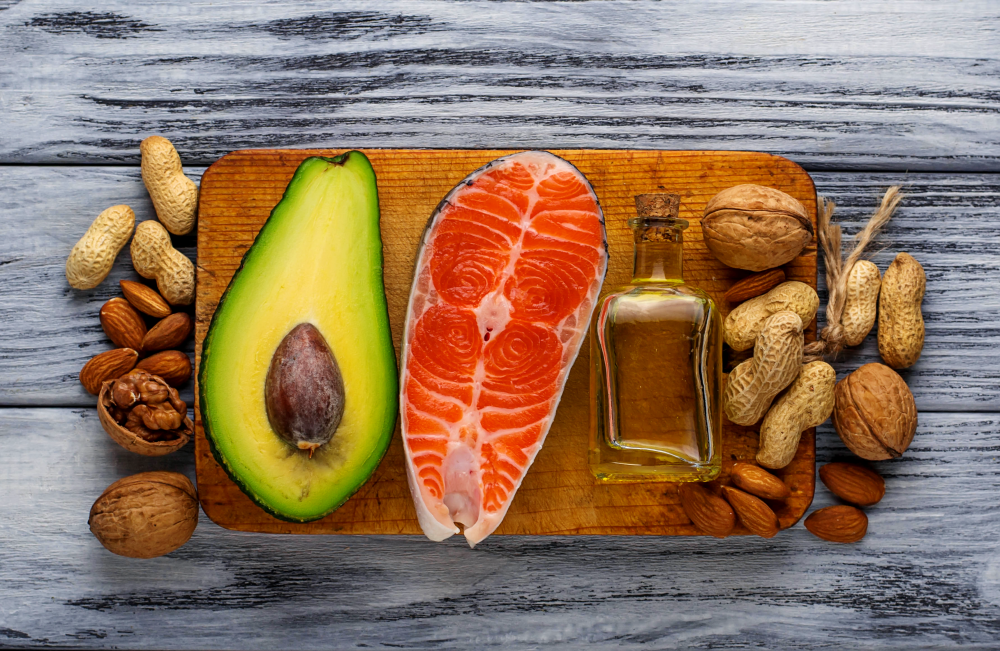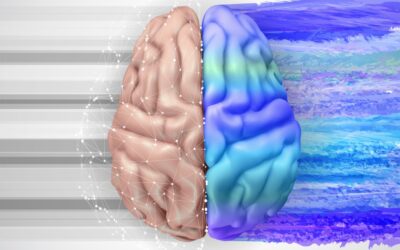Fat is one of three macronutrients found in food that is essential for cell survival in humans. However, it is often demonized as being “unhealthy”. But that couldn’t be further from the truth. Some fats have been linked to improved cognition and decreasing the risk of neurodegenerative disease. With that said, not all fat is created equal. There are two main fat groups.
Saturated fats are found in meat and dairy and unsaturated fats found in vegetable oils, nuts, and fish. Some saturated fats can be harmful if consumed in large amounts. On the other hand, unsaturated fats have significantly greater health benefits.
In this article, you will learn the difference between saturated and unsaturated fats, and how to select the best foods to get the maximum health benefits.
Health Benefits of Dietary Fats
Fat, also called triglycerides, have a number of health benefits.
- Energy: Fats are used for energy once glucose in the blood is depleted. Excess fat gets stored in the fat cells and in the liver. Fat provides 9 calories/ gram and therefore is a more concentrated source of energy compared to carbohydrates and protein (which provide 4 calories/gram). They are an important source of fuel for the body, especially during prolonged exercise or when carbohydrate stores are low.
- Nutrient absorption: Fats are necessary for the absorption of fat-soluble vitamins (A, D, E, and K) and other important nutrients such as carotenoids.
- Hormone production: Fats are essential for the production of hormones, including sex hormones and adrenal hormones.
- Cell membrane structure: Fats are a major component of cell membranes, helping to maintain their structure and function.
- Brain function: Fats are important for brain function, as the brain is composed of about 60% fat. Adequate intake of omega-3 fatty acids, in particular, has been linked to improved cognitive function and a reduced risk of dementia.
- Skin health: Fats are important for maintaining healthy skin, as they help to keep it moisturized and supple.
But as stated earlier, not all fats are created equal, and some types of fats can have negative health effects.
Harms associated with trans fatty acids (trans fat)
Trans fats, also known as partially hydrogenated vegetable oil is far more harmful than saturated fats. The most common type of trans fat is man-made. It’s created through a manufacturing process called hydrogenation and is used to extend the shelf life of food products.
Trans fats are known to:
- Increase LDL cholesterol (bad cholesterol) and decrease HDL cholesterol (good cholesterol) in the blood
- Impair insulin sensitivity: Trans fats may impair insulin sensitivity, which can increase the risk of type 2 diabetes.
- Harmful effects on the brain: Trans fats have been linked to cognitive decline and an increased risk of Alzheimer’s disease.
- No nutritional value: Trans fats provide no nutritional value and are not essential for health.
- Increase inflammation: Trans fats can increase inflammation in the body, which is linked to a variety of health problems, including heart disease, diabetes, and cancer.
The good news is that these fats are so bad they have been ban in most countries. However, there is a little loop hole in the “rules” and if there is less than 0.5 grams/serving, food manufacturers can put “0 grams” on the label.
That said, it is important to recognize the types of foods that may contain these harmful fats and make the effort to avoid them.
Foods that contain potentially harmful amounts of trans fats
- Fast foods—including tater tots, and French fries
- Most spreads—such as margarine spreads or peanut butter
- Snack foods—such as chips, crackers, and cookies
- Fried foods—including fried chicken, onion rings, and nuggets
- Nondairy creamer
- Pre-prepared cake frostings
- Vegetable shortening
- Commercially pre-prepared products, such as pie crusts, pizza dough, and cookie dough
- Pastries, donuts, and pies
“Healthy Fats”
Healthy fats are types of fats that provide important health benefits.
Here are some examples of healthy fats:
Monounsaturated fats
These fats are found in foods such as olive oil, avocados, nuts (such as almonds, cashews, and peanuts), and seeds (such as pumpkin and sesame seeds). They can help to lower LDL (bad) cholesterol levels and reduce the risk of heart disease.
Polyunsaturated fats
These fats are found in foods such as fatty fish (such as salmon, mackerel, and sardines), flaxseeds, chia seeds, and walnuts. They are important for brain function and can help to reduce inflammation in the body.
Omega-3 fatty acids
These are a type of polyunsaturated fat that are particularly important for heart health and brain function. They are found in fatty fish, flaxseeds, chia seeds, and walnuts.
Saturated fats
While saturated fats have been traditionally considered unhealthy, recent research suggests that some types of saturated fats (such as those found in coconut oil and grass-fed butter) may have health benefits when consumed in moderation.
It’s important to note that all fats are high in calories, so it’s important to consume them in moderation as part of a balanced diet. Aim to replace unhealthy fats (such as trans fats and saturated fats from processed foods) with healthy fats from whole foods.
Other articles you may be interested in:
Confinement….And Freedom
“Authentic freedom is actually the freedom of knowing who you are, why you are here, your purpose in life and where you are going when you leave here.” – Wayne Dyer Confinement. A word (in it’s various forms) used to describe someone with a physical limitation. “She...
You are suffering….and…….
Finally, brothers and sisters, whatever is true, whatever is noble, whatever is right, whatever is pure, whatever is lovely, whatever is admirable—if anything is excellent or praiseworthy—think about such things. Philippians 4:8 Toxic positivity is a real thing. In...
The Placebo Effect
“Just as thoughts are the language of the brain, feelings are the language of the body. And how you think and how you feel create a state of being. A state of being is when your mind and body are working together. So your present state of being is your genuine...
The victory speech
If my mind can conceive it, and my heart can believe it, then I can achieve it. Muhammad Ali “Always tell the truth”. Something most of us have been told from an early age. With that said, I have a slight aversion when it comes to “grandiose” personalities. You know...
External Factors: Necessary, but not sufficient
“Mind is the master power that moulds and makes, and man is mind, and evermore he takes the tool of thought, and, shaping what he wills, brings forth a thousand joys, a thousand ills. He thinks in secret, and it comes to pass. Environment is but his looking-glass.”...
Designed for more
If you made a New Year’s resolution and haven’t yet “fallen off the wagon”, congratulations. You are part of the “9% club”! Awe yes, New Year’s resolutions. In theory, they seem fantastic. According to a recent report the top 3 resolutions are related to finances,...
What “success” looks like…..
Success is peace of mind which is a direct result of self-satisfaction in knowing you did your best to become the best you are capable of becoming. John Wooden Not a week goes by I do not sit face to face with someone expressing a sense of "overwhelm". "Just tell me...
Radical Acceptance
“Pain is not wrong. Reacting to pain as wrong initiates the trance of unworthiness. The moment we believe something is wrong, our world shrinks and we lose ourselves in the effort to combat the pain.”― Tara Brach, Radical Acceptance: Embracing Your Life With the Heart...
Self-Discipline Isn’t Enough
All the energy in the universe is evenly present in all places at the same time. We don’t get energy, we release energy. And the triggering mechanism to release energy is desire. When you have a strong desire to do something, you will always have the energy to do it.”...
New Year, new you…..stop the insanity….
“Self-discipline is often disguised as short-term pain, which often leads to long-term gains. The mistake many of us make is the need and want for short-term gains (immediate gratification), which often leads to long-term pain.” ― Charles F. Glassman, Brain Drain –...











